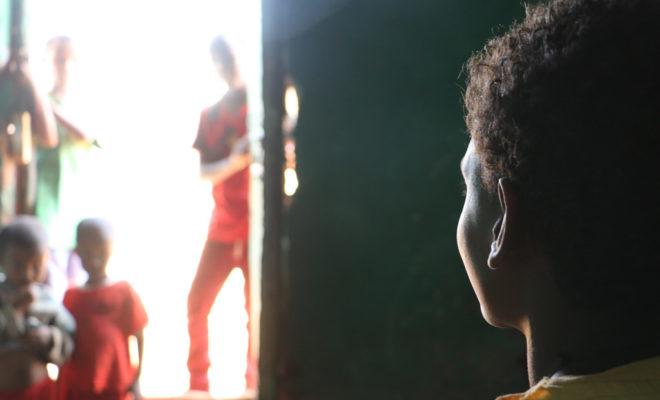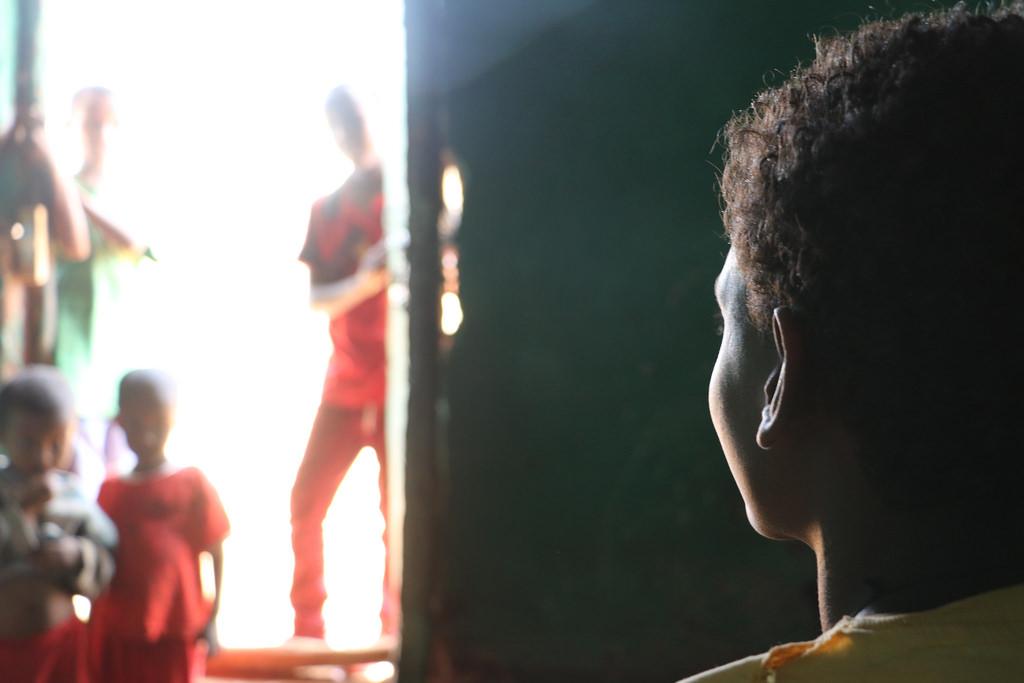“We can’t go home”: What does peace mean for Eritrea’s refugees?

For Eritrea’s refugees, the declaration of peace with Ethiopia has so far brought more uncertainty and fear than hope.

Ethiopia is home to around 160,000 Eritrean refugees. Credit: EU/ECHO/Anouk Delafortrie.
Sitting outside a corrugated metal office in the Mai Aini refugee camp, Biniam gazes at the passing trucks and busses as he reflects on the political changes unfolding dramatically in the region around him.
Sheltering in the shade, he notes that in just a matter of weeks, the relationship between Asmara – about 150 km north of here – and Addis Ababa – nearly 600 km south – has completely reversed. In barely any time at all, the open hostility that had shaped this region for two decades has made way for unreserved declarations of harmony and brotherliness.
“Peace is good for the mothers,” says Biniam, raising his voice above the noise of the traffic. “Every family has lost someone in the border conflict.”
Like many in Ethiopia and Eritrea, Biniam expresses hope at the two countries’ sudden return to peace after the deadly 1998-2000 border war. But he is also deeply anxious.
Biniam fled from Eritrea eight years ago and has lived in this refugee camp, just tens of kilometres from his homeland, ever since. The site sprawls along a busy road, which – when the border reopens after two decades – will be one of the main routes between Addis Ababa and Asmara. Biniam is afraid for his safety when this happens.
“The border is not the problem for refugees; the regime is,” he says. “How will Ethiopia protect camps with an open border? [The Eritrean government] will never let us live peacefully here.”
Many of the 160,000 Eritrean refugees in Ethiopia are nervous about what the rapprochement means for them. Several fled after being labelled political dissidents or have joined opposition groups and fear reprisals from Asmara. One young refugee revealed that he has not called home since phone lines resumed as he fears it could expose his location.
When the peace process began in June, Ethiopia asked Eritrean opposition groups to cease their activities, but assured them that can remain safely in the country. Many, however, believe that covert Eritrean intelligence agents could now penetrate their camps and capture them. This has been the case in Sudan where Eritrea’s refugees have been vulnerable to being seized and returned by the Eritrean military.
[Eritrea: History aside, what will peace mean for my loved ones?]
[Resolving the Ethiopia-Eritrea border: What actually needs to be done?]
Eritrea’s refugees await
In 2001, President Isaias Afwerki banned Eritrea’s independent media and jailed high-level politicians and journalists without trial. Since then, political protest has been virtually unheard of, while national service has been compulsory and indefinite. Thousands of young Eritreans flee the country every month despite the very real risks of shot or imprisoned.
President Isaias has often used the pretext of Ethiopian hostility to justify his policies, but since the declaration of peace there have been relatively few indications of tangible change. The conditions that led so many to flee the country are still in place and trust in the regime is in short supply.
“Real peace will come when we have a change of government,” says Kahsay, a refugee at the Hitsats camp. The conditions here are desolate, rife with malaria and short of water, but despite this, he insists: “Until we have real peace, we can’t go home.”
In meantime, however, many refugees are concerned about what their government’s change of policy will mean for their ability to apply for resettlement and asylum abroad. Ethiopia, for example, grants Eritreans prima facia refugee status, but it is unclear if this policy will last. In Europe, Eritreans are one of the largest groups of asylums seekers; some governments have tried to argue that they are economic migrants rather than political refugees and could be emboldened by the regional developments. Meanwhile, Israel has already suggested it will deport Eritreans if Asmara ends indefinite national service. Unless Eritrea gives amnesty to those who have fled illegally, this could place asylum seekers in grave danger.
Many refugees currently in Ethiopia also wonder what the presence of an Eritrean embassy in Addis Ababa will mean for them. Eritrean refugees needing passports to reunify with family members have previously had to travel to embassies in Uganda or Kenya. In exchange for consular services, the Eritrean government requires them to sign a letter apologising for leaving the country, admitting that they left for economic rather than political reasons, accepting punishment upon their return, and agreeing to pay a 2% annual income tax.
Some refugees in Ethiopia are hopeful they will now be able to obtain a passport more easily, but others fear the proximity of the Eritrean government. In the wake of the peace agreement, rumours circulated on social media that all refugees in Ethiopia were required to sign apology letters and return to Eritrea. The United Nations High Commissioner for Refugees (UNHCR) quickly refuted those false reports, but even though unfounded, news like this could lead to mass refugee flight out of Ethiopia and towards Europe.
Despite Ethiopia and Eritrea’s mutual hostility, Eritrean refugees were previously welcomed in Ethiopia. But now, those like Biniam don’t know whether they will be seen as enemy aliens or guests. While others on both sides of the border may be celebrating, for them, the promise of peace has so far brought more doubt than hope.
“The political situation is very tense and when it is tense, we feel worried,” says Biniam. “We don’t know what will happen.”
—





This is not a cartoon movie where everything happens right away and quickly.
You want refugees to return 2 weeks after peace? I am sure You as a professor are demon-rat party supported (more than likely).
0bama , UN, that witch Clint0n and the rest of you demo-Rats were the reason we were in misery (both eth and eri).
STAY OUT OF OUR BUSINESS. WE DO NOT NEED your INFLUENCE OR OPINION.
Get back and prepare for civil war with Trump and good luck.
You are flashing here Typical victim mentality. How about holding accountable out fat, criminal vicious fat dictators for a sec? I am Eritrean decent and there is not ONE single enemy for most of Eritrean problem than my un elected brutal dictator Essayas. Why not hold him and almost all African low IQ fat stupid dictators???? where average dictatorship is 40 years these days and they leave with bloody mess even after that??? keep blaming and see where that ends you:(
cloroquine https://chloroquineorigin.com/# what is hcq drug
cialis alternative https://cialiswithdapoxetine.com/